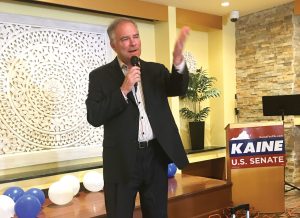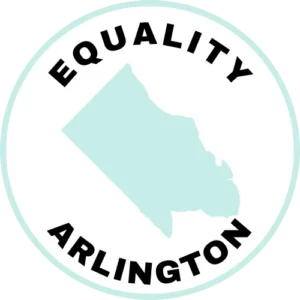
In the basement of the Winter Hill apartments where non-profit Court Appointed Special Advocacy de Virginia holds community meetings, staff member Eduardo Zelaya calls out of the audience 30-year-old Deferred Action for Childhood Arrivals recipient Ermanda Dean and asks her to engage in a mock verbal tug of war with three people acting as representatives of the Trump administration. He then asks if anyone who knows a DREAMer to join the tug-of-war team, and he finally asks anyone for whom the issue is important to join.
“Y aqui estamos and no vamos!” one participant shouts as the rest of the crowd cheers.
For Court Appointed Special Advocacy, or CASA, this meeting isn’t just about a team-building exercise teaching strength in numbers. It’s an expression of communal support for those like Dean whose status is now in limbo because of the Trump administration’s recent decision to rescind former President Obama’s executively administered Deferred Action for Childhood Arrivals, known as DACA, amnesty program, tasking Congress to find a way to legislatively acknowledge it within six months time.
“Someone might ask why I am going to that meeting if I have no hopes of legalizing my status,” CASA Advocacy and Political Specialist Jorge Mendez tells the crowd. “But at the local level, we have a strategy that we have to protect them. We have to define how we’re going to go to the sheriffs, the cities and the police force.”
Jennifer Romero and her brother, Angel, came to the U.S. 17 years ago when they were 4 and 2, respectively, and hardly have any memories of the country of their birth. Like many at the meeting, they only found out about their status when DACA was created in 2012. Others like Dean knew about her status but weren’t legally brought out of the shadows until DACA was created.
Since then, these people have been able to get driver’s licenses, work jobs and get admitted to college. Jennifer and Angel both have been accepted to four-year colleges and were in the process of working from home to afford tuition first.
“This is not the time to cry. This is the time to take action,” Romero said to the group.
In an office near Bailey’s Crossroads, Immigrant Advocacy Program director Simon Sandoval-Moshenberg of the Legal Aid Justice Center has been flooded with calls from former clients, many whom are in college or graduates in the workforce. All are worried about how DACA’s possible termination will change things for them.
“It’s what this population symbolizes,” said Sandoval-Moshenberg, “These are the shining stars of the immigrant community. For many families, these people represent the success story of the family.”
An aura of uncertainty pervaded his conversations in prior weeks. A week before Trump’s announcement, he had to advise a DACA student against embarking on a study abroad program she already paid for because he couldn’t assure her she’d be let back into the country. Now that the announcement has passed, he’s faced with a new set of challenges.
“It’s the difference of knowing whether you’re going to get executed or knowing the date of the execution,” Sandoval-Moshenberg said. “I don’t know which would let someone sleep more or less soundly but people who have had legal status for five years are now facing the likelihood that, unless something changes, they’re gonna lose the legal status they’ve built for themselves.”
In the short-term, Sandoval-Moshenberg is focused on the relatively small subset of people (estimated at 2,750 in Virginia) who are eligible to renew their permits for two-year stays if they can meet an October 5 application deadline.
A large part of the battle is assuring people of support who would otherwise be afraid to seek help. Leobardo Eslava, who attended the CASA meeting at Winter Hill, said that when he tries to explain to others to meet and mobilize, a lot of people are hesitant to leave their homes.
“We have to work on our community’s self-esteem to make sure we know we can make a change,” said Mendez during the CASA meeting. “Are we not going to be able to take our kids to school, are we not going to go to hospitals, are we not going to work? Are we gonna keep hiding in houses? Either way, we’ll be captured.”
At the CASA meeting and in his advocacy, Mendez’s strategy doesn’t just involve advocating for short-term and expansive change at the local level but a codified separation between law enforcement and immigration law, even while mobilizing locally.
Another major community asset, the Catholic Church has taken a rare political stance. The U.S. Conference of Catholic Bishops issued a statement calling the administration’s actions “a heartbreaking moment in our history that shows the absence of mercy and good will” and pledged support to finding an “expeditious means of protection for DACA youth.”
Father Matthew Zuberbueler at St. Anthony of Padua Catholic Church in Falls Church said that his sermons aren’t ordinarily political. However, because the issue is in the forefront of congregation members minds, he is considering bringing it up by encouraging people to make their voices heard through reasonable means.
“One of the things I find is that when people meet people, it’s no longer a political issue. Our parish is so diverse, so I’ve seen a lot of our congregation who aren’t Hispanic. They have a heart for people, people who aren’t safe to be able to work and accomplish what they want in their lives,” Zuberbueler said.
Though the future is uncertain, some DACA recipients hope a better solution might emerge because they know firsthand that DACA was insufficient.
“I never wanted to be a DREAMer,” said CASA staff member and DACA recipient Luis Aguilar whose father was deported. “By calling myself a DREAMer, it separated me from my family. Because I’m a young person and people are more sympathetic to my story, [that] doesn’t mean that I want it. What I care about is immigration reform.”
In in the interim, local advocates like CASA, the Legal and Justice Center and multiple people are ready to do whatever they can.
“I’m not in the business of predicting what Congress will or won’t do. My crystal ball is no better than anyone else’s, but what I will say is we’re not gonna go wait on our hands and knees. We’re going to try to do everything to influence the decision,” said Sandoval-Moshenberg.












